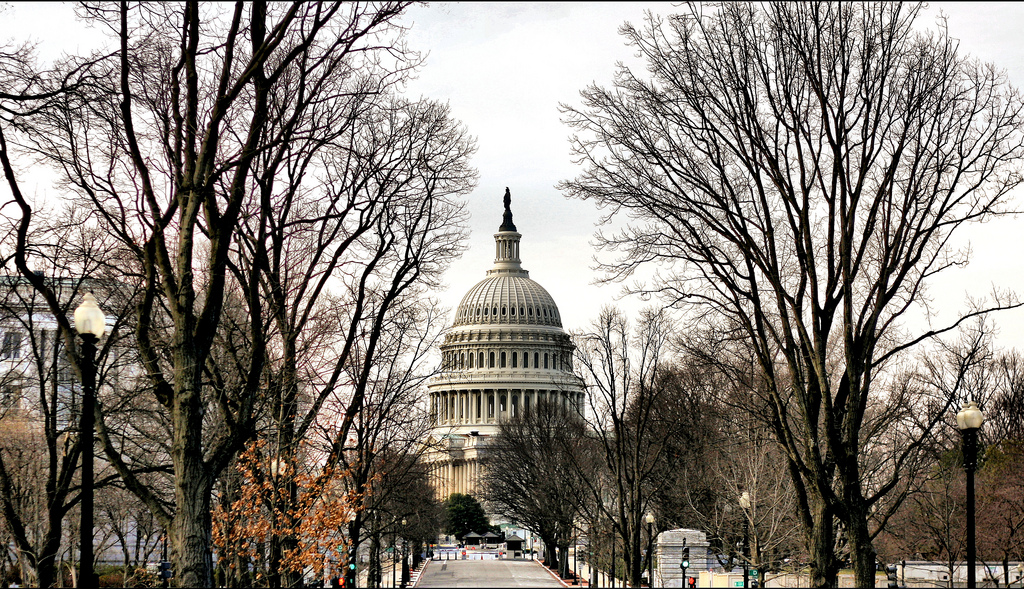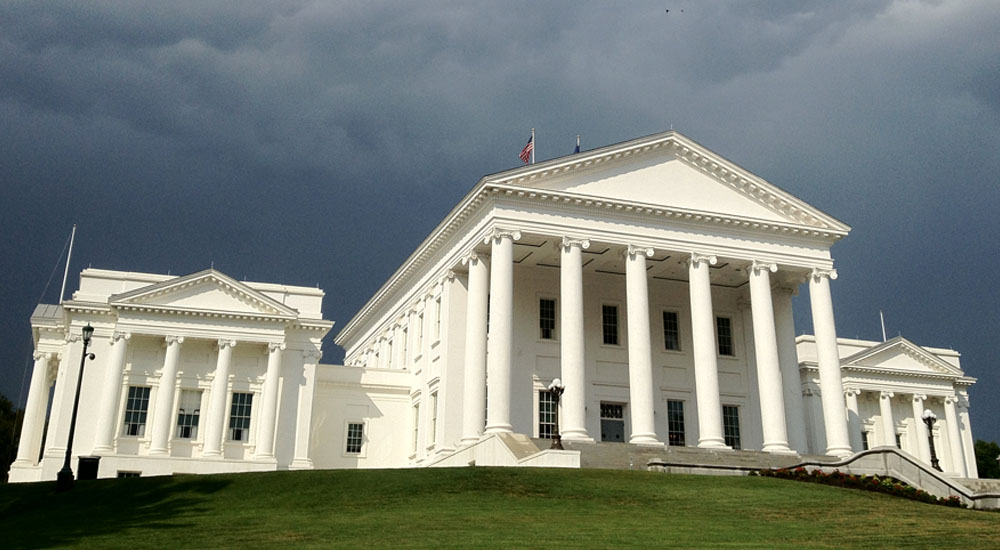GOP lawmakers passed legislation during this year’s 46-day session to help reform adoption procedures in Virginia.

Virginia's Public Square
Virginia's Public Square
Featured posts

GOP lawmakers passed legislation during this year’s 46-day session to help reform adoption procedures in Virginia.

Pam Northam, the wife of embattled Virginia Governor Ralph Northam (D) is now under fire after upsetting an eighth-grade African-American girl during a tour of the Executive Mansion as she was handed a piece of cotton by the First Lady, also asked to imagine being enslaved. The latest racial debacle comes almost one month after the governor reportedly appeared in a racist photo in his 1984 Eastern Virginia Medical School yearbook – either dressed in blackface or wearing Ku Klux Klan robes and hood – but denied doing so.
Questions were also raised about another yearbook photo, this time while Northam was a cadet at the Virginia Military Institute (VMI) in the early 1980s, where his nickname of “Coonman,” a racial epithet, is placed below his head shot.
In the days following, Governor Northam walked back his admission of appearing in the first photo, which included an attempt to moonwalk in front of reporters in a crowded room, and his wife telling him “inappropriate circumstances.”
However, it seems the Commonwealth’s First Lady did not heed her own advice amid the loathsome beginning of the racial “reconciliation tour.” Last week, the first stop at Virginia Union University (VUU) had to be cancelled due to widespread student backlash and subsequent calls for him to step down from office.
Nevertheless, another instance of racial insensitivity has led to the governor’s scandal being spread to his wife.
“The Governor and Mrs. Northam have asked the residents of the Commonwealth to forgive them for their racially insensitive past actions,” wrote Leah Dozier Walker, who oversees the Office of Equity and Community Engagement at the Virginia Department of Education. “But the actions of Mrs. Northam, just last week, do not lead me to believe that this Governor’s office has taken seriously the harm and hurt they have caused African-Americans in Virginia or that they are deserving of our forgiveness,” she added in her February 25 letter to Virginia lawmakers and the office of the governor.
On February 21, the Northams hosted a gathering at the Executive Mansion in downtown Richmond of approximately 100 youths who had served as State Senate pages during this year’s legislative session. Pam Northam took groups of pages on a tour through the building – built in 1813 by slave labor and is the oldest active governor’s residence in country – and in the kitchen, she held up samples of cotton and tobacco to a group of about 20 children and described the enslaved workers who picked it.
“Mrs. Northam then asked these three pages (the only African-American pages in the program) if they could imagine what it must have been like to pick cotton all day,” Walker wrote. “I can not for the life of me understand why the First Lady would single out the African-American pages for this — or — why she would ask them such an insensitive question.”
The governor’s office said the First Lady handed the cotton to whomever was nearby, both African-American and Caucasian pages, and wanted everyone to note the “sharpness” of the cotton boll and imagine how uncomfortable it would have been to handle all day.
In a letter written by Walker’s daughter addressed to Pam Northam, the young girl said she did not take the cotton, but her friend did.
“It made her very uncomfortable,” the girl wrote. “I will give you the benefit of the doubt, because you gave it to some other pages.”
“But you followed this up by asking: ‘Can you imagine being an enslaved person, and having to pick this all day?’ which didn’t help the damage you had done,” the girl added in her letter to Pam Northam.
While the First Lady offered the cotton to all of the pages in attendance over multiple tours, the situation shows a gross negligence of understanding the environment surrounding Virginia’s executive branch over the entirety of February, which is also, quite ironically, Black History Month.
“I regret that I have upset anyone,” Pam Northam said in a statement from the governor’s spokeswoman, Ofirah Yheskel.
Although Governor Northam has committed to dedicating the remainder of his term in office, which ends January 2022, to “racial equity” and “healing,” the calls for his resignation are far-reaching. After the latest development, it seems that not much thought is being taken into account for whatever “healing” the governor and his family are attempting to promote.

Republicans say the legislation will result in law-abiding citizens becoming swept up in federal bureaucracy, and is the first step towards establishing a national firearms registry.

In the weeks since photos were released of Virginia Governor Ralph Northam (D) reportedly appearing in racist garb, nearly every elected official has responded to the situation – Virginia legislators, U.S. senators, and even 2020 presidential contenders. Though, the one who battled against Northam in the 2017 gubernatorial race, Ed Gillespie, has not responded, until now.
The former Republican candidate for governor was recently asked to give his take on the matter at the Heritage Foundation’s Jay A. Parker lecture and reception.
“For Virginians, this is a very painful time to see these images splashed up on television screens and newspapers, and it doesn’t reflect the Virginia that I know and my fellow Virginians [know],” Gillespie said as he started off his monologue.
“Virginia has a long history when it comes to race, obviously.”
“From our very founding, Virginia and Virginians have been at the very forefront of American history,” he said, meanwhile noting the Commonwealth has, in fact, been on the “wrong side” of that history many times.
Gillespie explained that Virginia was the home of “massive resistance,” a political a strategy enforced by Democratic U.S. Senator Harry F. Byrd, Sr. to unite white leaders against public school desegregation. Nevertheless, he added that Virginia was also the nexus of the U.S. Supreme Court’s decision in Brown v. Board of Education (1954), cementing the notion “separate is not inherently equal.”
Referencing Farmville’s Russa Moton High School, Gillespie explained that “more students who were plaintiffs in Brown v. Board were Virginians than from any other state.”
Adding his reverence for the school, which is now a museum commemorating the student birthplace of the American civil rights movement, he said of his experience, “when Barbara Johns led that walk-out, you feel like you’re there.”
“Cappahosic is the cradle of Virginia civil rights and really of American civil rights,” he explained, adding the “Gloucester Institute does a fantastic job on that beautiful piece of property where Dr. [Martin Luther] King [Jr.] stayed before the ‘March on Washington.’ [We’re] proud of that history in Virginia.”
According to the Gloucester Institute, the United Negro College Fund (UNCF) was first conceived at that location, which led to Dr. Frederick Patterson, the son-in-law of Dr. Robert Russa Moton, becoming the first UNCF President. Furthermore, strategies were conceived at Holly Knoll at Cappahosic for the desegregation of lunch counters, and “[o]n a bench under the 400-year-old live oak, Dr. Martin Luther King, Jr. is said to have drafted portions of the ‘I Have a Dream’ speech.”
Gillespie also said he and Virginians are proud to celebrate “the 30th anniversary of the first inauguration of an elected black governor in the history of the United States of America.” Governor L. Douglas “Doug” Wilder served as the 66th governor of the Commonwealth, also going on to become the first directly-elected mayor of Richmond from 2005 to 2009.
Continuing his response, the former GOP gubernatorial candidate said, “while we’re seeing some imagery right now that does not reflect well on some of the leadership in Virginia, we have much to be proud of, [but] we have a long way to go.”
“One of the things that we’re seeing in American society right now is a sorting that’s going on, and it’s not just in the media…we’re living with people whom we agree and not around people with whom we disagree – there is a real sorting on and that’s a problem.”
He explained that when he ran for office he would “go places I otherwise would not go, and to meet people I otherwise would not meet, and that was enlightening to me, and to try and look at things through other people’s eyes.”
Gillespie then told an anecdotal tale about the “Black Lives Matter” movement, which has led the renewed charge for race relations over the past few years.
“I remember the first time I saw that, and my initial, immediate reaction was similar I suspect to a lot of people, which was ‘well of course black lives matter, all lives matter.’ But then I stopped and thought, ‘I have never once in my life felt the need to stand up and shout white lives matter,'” he said.
“When you hear a significant portion of your fellow Americans feeling compelled to call this to your attention you need to stop and listen, and it affected my thinking in terms of criminal justice reform and a number of other things.”
Throughout his campaign for governor, Gillespie had conversations with incarcerated individuals and victims of crimes to bridge the gap between racial disparities in the criminal justice system and socioeconomic factors that hold back some Virginians. Moreover, he commonly told voters the criminal justice system should be “just, fair and redeeming,” with Virginians exiting the system “more prepared to live a full and contributing life in society.”
Ending his response during the Heritage Foundation’s lecture, Gillespie said, “This is a rough time in Virginia, it is not reflective of the values and the people of Virginia, and we’ve had tough times before and we’ve gotten through it and I’m confident we will get through it now.”

The vote on the Born-Alive Abortion Survivors Protection Act compelled lawmakers to defend the indefensible, put names to those disregarding life, revealed the sanctimonious nature of the Democratic Party, and codified the consistent logical and philosophical irregularities of the dehumanization and political categorization that governs the liberal point of view.

As the resolution goes to the Senate, it will test Republican unity as a few moderate GOP senators have signaled they will vote with the liberal side of the aisle.

The Virginia House GOP released a video earlier this week touting legislative accomplishments made during this year’s 46-day session on Bank Street in Richmond. Republicans pushed through nearly $1 billion in tax relief, K-12 and college education enhancements, government reforms, and a myriad of other measures amid the racial and sexual scandals blanketing the Commonwealth’s Democrat-led executive branch.
To recap February’s controversies:
Governor Ralph Northam (D) reportedly appeared in a photo in his 1984 Eastern Virginia Medical School (EVMS) yearbook either in blackface or in KKK robes. He first confirmed that he was in the photo – not saying which one – then backpedaled the day following at a very odd press conference, which included an attempt to “moonwalk” in front of reporters and his wife, Pam, telling him “inappropriate circumstances.”
A yearbook photo was also released of Northam while he was a cadet at the Virginia Military Institute (VMI) in the early 1980s. Placed underneath his head shot was his nickname, “Coonman,” a racial epithet.
Embarking on his racial “reconciliation tour” last week, the governor gaslighted America again, calling slaves brought to America in the early 1600s “indentured servants” during an interview with CBS‘s Gayle King, chalking up his blackface photos to “white privilege.” Moreover, the first stop on his tour had to be cancelled following widespread student backlash at Virginia Union University (VUU) continuing calls for his immediate resignation.
Lieutenant Governor Justin Fairfax (D) now faces at least two sexual assault accusations that has Republicans in the House of Delegates proposing an investigation into the matter, and Democrats declining to participate in the bipartisan process.
Dr. Vanessa Tyson, a Scripps College professor, has alleged that Fairfax sexually assaulted her at the 2004 Boston Democratic National Convention. In her statement published by the New York Times, Dr. Tyson said she came forward after the news of Fairfax’s likely elevation to the top political position in Virginia as the governor is embroiled in racial controversy, because it “flooded” her with “painful memories, bringing back feelings of grief, shame, and anger that stemmed from an incident with Mr. Fairfax.”
Meredith Wilson, a student at Duke University in 2000, while Fairfax also attended the North Carolina college, came forth days later with allegations that she was raped by Fairfax in a “premeditated and aggressive” fashion.
Fairfax has called the accusations “false and unsubstantiated,” a “totally fabricated story,” and “demonstrably false.” The lieutenant governor has also accused staffers of the embattled governor for leaking the allegations and engaging in a “vicious and coordinated smear campaign” to derail his pathway to the governor’s office.
Attorney General Mark Herring (D) also admitted to wearing blackface, trying to look like black rapper Kurtis Blow at a party at the University of Virginia (UVA) in Charlottesville in 1980. His admission came just a few days after he called for Northam’s resignation for appearing in racist photos.
Although the calls for Northam to step down from office are far-reaching, many have claimed that officials are backing off of Herring to resign for political reasons.
Nevertheless, amid the national embarrassment, Speaker of the House of Delegates Kirk Cox (R-Colonial Heights) reassured Virginians that although “our diverse Commonwealth has been deeply shaken,” it nevertheless “remains economically vibrant, fiscally sound, safe and secure.”
Finishing off the 2019 legislative session on Sunday morning, Republicans were able to deliver on a key promise to return $976 million from the federal Tax Cuts and Jobs Act (TCJA) to taxpayers.
Under the plan, the Commonwealth’s standard deduction would be increased by 50 percent – the first such change for individual filers since 1989 – rising from $3,000 to $4,500 for individuals, and from $6,000 to $9,000 for couples, primarily benefiting lower and middle-income taxpayers. The plan also preserves existing state law on the deductibility of state and local taxes (SALT), provides additional tax refunds of $110 for individuals and $220 for couples, and much more.
Overall, 70 percent of rebates will go to taxpayers making $100,000 or less.
Despite providing tax relief, House Republicans were also able to secure a five percent pay raise for teachers, which will be included in the final budget.
Primed to increase security in schools across the Commonwealth and protect students, teachers, and staff from harm during emergencies, the GOP also worked to pass a myriad of legislation that created a multi-year blueprint for improving school safety.
Parts of the legislative package would require school counselors to spend at least 80 percent of their time counseling students, mandates that school officials set forth annual safety training in public elementary and secondary schools, develop a case management tools for school threat assessment teams, and provide approximately $12 million to fund school safety initiatives, including additional money for school resource officers (SROs), infrastructure improvements, and technology upgrades.
Built on the 24-point priority recommendation plan from the Select Committee on School Safety, Speaker of the House Cox called the work “groundbreaking.”
The statehouse also passed legislation to lift the age cap on autism health coverage. Under current Virginia law, insurers must cover treatments for autism spectrum disorder (ASD) from ages two through 10, which has placed a difficult burden on families as the average age of diagnosis is between six and seven years of age, according to a report from VCU’s Autism Center of Excellence.
Striking away ASD as the only medical condition subject to coverage limitations based on the age of the patient, the GOP-led legislation means that approximately 10,000 Virginians with autism will have expanded access to healthcare, requiring health insurers to cover treatment regardless of the patient’s age.
While the chaos from the Democratic executive branch may have rendered a stain on the “Virginia Way,” Republicans showed that leadership matters, providing good governance for the Commonwealth’s citizens.

In the 12th hour of the 2019 legislative session in Richmond, lawmakers rejected a bill aimed at keeping drivers off their phones.

The GOP addressed teacher shortages, bolstered work-based career and technical education, promoted energy-efficient school infrastructure, mitigated risks associated with student-athletes playing sports with concussions, and allowed school boards to begin the school year earlier.

Republicans tackled political redistricting, the State Board of Elections, the processing of “Governor’s Papers,” bookkeeping for local treasurers, and even expanding the sale of booze on Sunday.